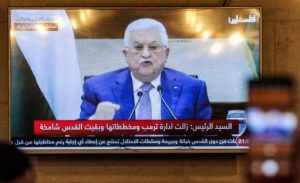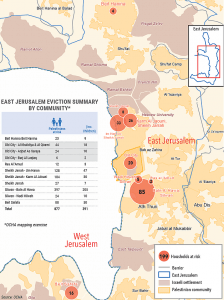by Miceál O’Hurley
Diplomatic Editor
EAST JERUSALEM – The President of the State of Palestine, Mahmoud Abbas, has announced that the scheduled May and June elections that would have been the first elections for the Palestinians since 2006 have been postponed. Speaking after a meeting with Palestinian factions earlier this week, Abbas addressed the Palestinian people on television, saying, “Facing this difficult situation, we decided to postpone the date of holding legislative elections until the participation of Jerusalem and its people is guaranteed.” Abbas added, “Jerusalem will not be compromised, and our people in Jerusalem will not give up their right to exercise their democratic rights.”

Abbas laid the blame for the postponement of the elections at the feet of Israel which has reportedly yet to commit to allowing the Palestinians of Israeli Occupied East Jerusalem to exercise the right to vote without restrictions. Both the Palestinian State and Israel assert competing claims over the territorial ownership over East Jerusalem.
European Union Support Sought by Palestinians
Speaking on Palestinian TV, Abbas indicated the Palestinian Authority had repeatedly sought assurances from Israel to assure all Palestinians in East Jerusalem could vote without restrictions. Abbas has also called on the European Union to exert its influence, however, without result.
Abbas indicated he had received correspondence from Israel on 29 April 2021 indicating the State was unable to take any position on the elections as Israel has only a caretaker government since last month’s elections. There was no clear winner in Israel’s recent elections and a coalition government has yet to be formed.
Minister Simon Coveney Opines
In a Statement released on 30 April 2021, Ireland’s Foreign Affairs Minister, Simon Coveney, T.D., said the following, “I am extremely disappointed by the decision to postpone long-awaited Palestinian elections. Free, fair and inclusive elections across the occupied Palestinian territory, which includes East Jerusalem, are of critical importance for the Palestinian people. Elections are particularly important for young people who deserve the opportunity to express their democratic voice.”
Coveney continued, “I encourage the Palestinian Authority to set a new date immediately for elections. The cooperation of the Israeli authorities is essential and any failure to do so would be damaging to democracy and to peace. I urge Israel to live up to its responsibilities as the occupying power and to cooperate in facilitating voting, including in East Jerusalem. I urge the Palestinian Authority to renew its commitment to strong and inclusive democratic institutions, which are in the interests of all and important for renewed engagement on a two-State solution.”
Palestinian Ambassador to Ireland Reacts
The Ambassador of the Mission of the Palestinian State to Ireland, Her Excellency Dr. Jilan Abdalmajid, was clear that in order to protect the rights of all Palestinians, the elections could not go forward at this time because of Israel’s refusal to guarantee fundamental democratic rights to the Palestinian people of East Jerusalem despite previous accords between the Palestinians and Israel.

Speaking to Diplomat Ireland, Dr. Abdalmajid said, “The international community has a responsibility to put pressure on Israel to guarantee a free election in East Jerusalem and Area C. We signed the Oslo agreement with Israel which gave our people in East Jerusalem the right to participate in the election. Israel is now denying this right.” Her Excellency continued, “As we have said from the beginning, ‘No election without East Jerusalem’. We have the right to nominate, campaign and elect in East Jerusalem. East Jerusalem is part of the occupied Palestinian Territories. If Israel agrees to facilitate the process, our leadership will go ahead with the election exactly as it happened in 2006.”
Palestinian Voting Rights at Stake
The Palestinians maintain that some 150,000 Palestinian voters in East Jerusalem should be allowed to cast their ballots in East Jerusalem. A previous agreement with Israel concerning Palestinian voting rights allowed for only some 6,300 Palestinians to vote in East Jerusalem and then, only at Israeli-designated post offices. Under this agreement, the remaining Palestinians of East Jerusalem were only allowed to cast their ballots if they did so outside of the boundaries of East Jerusalem.
Some international voting observers have likened such Israeli imposed restrictions as being tantamount to new measures being taken by Republican Party led State Legislatures in the United States designed to restrict voting rights. These acts are commonly referred to ‘Jim Crow’ laws, harkening to the racist, segregationist era in American history when Black Americans were systematically denied the franchise to vote by local laws all while supposedly upholding Constitutional rights. Several U.S. States have enacted new voter restrictions widely considered a veiled attempt at voter suppression for people of Colour obstensibly violating their fundamental civil rights.
Why is East Jerusalem the Epicentre of Dispute?
Following the 1967 War, Israel began a military occupation of East Jerusalem with General Moshe Dyan declaring “The Israeli Defense Forces have liberated Jerusalem. We have reunited the torn city, the capital of Israel. We have returned to this most sacred shrine, never to part from it again.” Subsequently, Israel implemented a series of policies to copper fasten their control over East Jerusalem.

On 27 June 1967, Israel adopted ordinances asserting jurisdiction and administration of the State of Israel to an area defined as the ‘Old City’, Sur Baher, Sheich Jarakh, the Kalandia Airport, Mount Scopus and vicinity, and Sha’afat. Israel contemporaneously extended the boundaries of the Jerusalem Municipality with the results that many Palestinians were forced to leave their homes and Israeli populations would become a de facto majority in East Jerusalem. On 29 June 1967, Israel promulgated a Military Defense Order which dissolved the elected Municipal Government of East Jerusalem and dismissed the mayor, effectively depriving Palestinians of a representative government. Thereafter, the 21 member, all-Israeli, Municipal Government Council of West Jerusalem, entirely absorbed the authority, jurisdiction and administration of East Jerusalem.
Immediately following cessation of hostilities in the 1967 ‘Six Day War’ the United Nations General Assembly requested Secretary General U Thant to dispatch an envoy to the region to asses the situation. Ambassador Anton Thalmann of Switzerland was appointed to conduct a fact-finding mission and report his findings to the Assembly.
Israel claimed they would act in the best interest of the Palestinians and promote them acquiring the same standard of living as Israelis. Moreover, Israel explained the number of steps they were undertaking to normalise the situation, including re-opening access to both Islamic and Christian holy sites, re-opening schools, administering local government and improving infrastructure as well as beginning the process of ‘integration’.
For their part, beyond the obvious issues of occupation, Palestinians protested the dynamiting and bulldozing of 135 houses dating from the fourteenth century in the Maghrabi quarter, mostly owned by the Waqf, in front of the Wailing Wall. The Israeli destruction of Palestinian homes resulted in the expulsion of some 650 persons. Palestinians also complained that Israel had evicted some 3,000 Arab residents from the Jewish quarter (also owned by the Waqf) at short notice and had taken a girls’ school owned by the Waqf as the seat of the High Rabbinical Court.
Israel’s parliament, the Knesset, passed the Jerusalem Law (1980) which declared, inter alia, “Jerusalem, complete and united, is the capital of Israel”. Palestinians point to the Jerusalem Law as an act of illegal annexation of East Jerusalem. Israel continues to highlight that neither the Jerusalem Law or subsequent legislation provides for any formal annexation. However, the United Nations condemned Israel’s actions, declaring the Jerusalem Law (1980) declaration to be “null and void” under United Nations Security Council Resolution 478.
Is Israel or Domestic Politics to Blame?
Today, Palestinians complain that they have been subjected to increasing displacement in Israeli Occupied East Jerusalem, frustrated in their exercise of fundamental rights and face being deprived of their democratic right to vote in Palestinian State elections. Israel claims that the Palestinians have continually refused to engage in good faith discussions to resolve outstanding issues remaining from the Oslo Accords that were to provide for a ‘Two State Solution’. As for the elections, Israel contends that this is an internal issue for the Palestinians and as in 2006, Palestinians are free to vote under the prior agreements reached with the Palestinian Authority.

The previously schedule May and June elections offered the Palestinians an opportunity to show national unity. Following the 2006 elections, internecine violence resulted in the Palestinians effectively being governed by two factions – Abbas’ Fatah party with its strong showing in the Occupied West Bank and the militant Islamist Hamas party asserting control over the Gaza Strip.
Hamas recently issued a warning to Abbas about consequences should he cancel the upcoming elections, writing, “[Palestinians should seek ways of] forcing the elections in Jerusalem without the permission of or co-ordination with the occupation.” Hamas, which hoped to make further gains in the elections, condemned the postponement, saying, “[Hamas] doesn’t agree with the national consensus and popular support and [this] is a coup.”
Critics of Fatah, Hamas and the Palestinian State claim Israel is being made a scapegoat for fears that Fatah has fallen in popularity amongst the Palestinian people and Hamas would have made further gains in this round of elections. Abbas and Fatah reject such assertions and are passionate about arguing about their responsibility not to allow the rights of Palestinians in East Jerusalem to be abrogated, or concede legal authority over the historic and sustained Palestinian claims on East Jerusalem itself.
Elections Key to Shaping Chances for Resolution of Palestinian-Israel Relations
The practical political landscape has changed little since the last elections in 2006. The remarkable surge in support that resulting in significant gains by Hamas and the establishment of the short-lived Fatah-Hamas Coalition continues to shapes the political landscape, not only for the Palestinians, but for Israel.

The May and June elections had offered the Palestinians and opportunity to demonstrate unity and heal the divide that has left Hamas in effective control over Gaza and has seen Fatah dominate over the West Bank. Beyond that, the real issue remains – how to improve conditions, safeguard rights, assert autonomy and free the Occupied Palestinian Territories from effective Israeli control.
Hamas, which continues to deny Israel’s right to exist, is increasingly isolated in a region where the Abraham Accords have not only extended neighbouring States’ recognition of Israel but added to its significant diplomatic, social, economic and defense influence throughout the Middle East. Arab governments have traditionally been defenders of the Palestinian people, even with limited success. Given their non-cooperation stance with Israel, chances that Hamas can improve their standing, exert autonomy and improve the daily lives of the more than 1 million Palestinians living in Gaza and the West Bank is highly questionable. Few in the region have an appetite to see the Palestinians and Israelis devolve into open armed conflict again.
For Fatah, the declining standard of living for Palestinians and lack of fundamental achievement in shirking-off the Israeli occupation since the last elections fifteen years ago has left many Palestinians questioning their future.
The stakes are high and it remains uncertain if or when the elections will be rescheduled.
















































